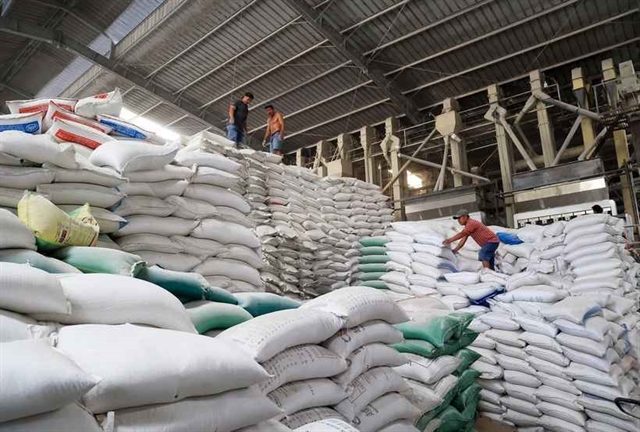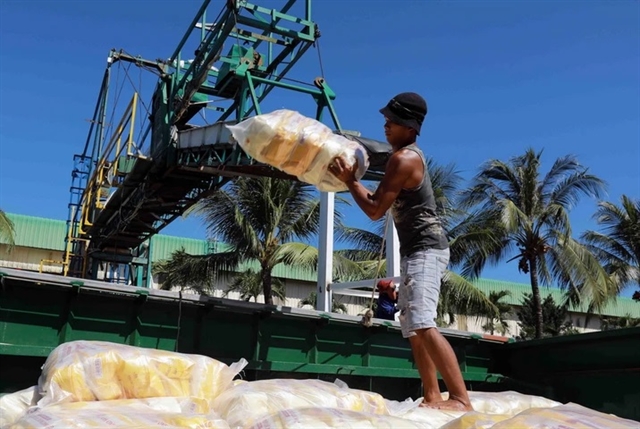 Economy
Economy

 |
| Rice being loaded on a barge for transport in the Mekong Delta province of Cần Thơ. — VNA/VNS Photo |
HÀ NỘI — There should be a minimum export price for Vietnamese rice to prevent companies from engaging in price wars, undercutting each other, said industry insiders after a recent incident in which Vietnamese exporters won a bid to supply Indonesia’s State Logistics Agency (Perum Bulog) with 100,000 tonnes of rice for a total of US$55 million.
Lộc Trời had the lowest bidding prices among bidders at $563 per tonne, $16 lower than the initial price of $579 per tonne and $24 lower than the domestic rice price listed by the Việt Nam Food Association.
Huỳnh Thị Bích Huyền, chairwoman of the Ngọc Quang Phát Import-Export Joint Stock Company based in the Mekong Delta province of Cần Thơ, said the Vietnam Food Association (VFA) should establish a minimum price for rice exports. She said the minimum price, once implemented, would prevent bidding exporters from selling too low, ensuring safety for themselves and farmers.
“Right now we need solidarity and cooperation among Vietnamese rice exporters. Established corporations such as the Northern Food Corporation (Vinafood 1) and Southern Food Corporation (Vinafood 2) can represent Vietnamese rice exporters in bidding wars in certain countries. Once the contracts are secured, they can divide the orders later,” she said.
Huyền said the most important objective remains the bottom line.
“It’s useless, if not counter-productive, to win many low-priced contracts, which are very likely to cause loss to both exporters and farmers,” she added.
Huyền was concerned that if exporters abuse fire-sale tactics to get out of short-term financial difficulties they will pose a danger to themselves, farmers and their creditors.
Others took an alternate view, voicing their support for giving exporters freedom to conduct business and negotiate prices with their buyers.
“We all want to sell rice at a high price but rigid sticking to a rule can mean no contracts at all,” said Nguyễn Việt Anh, director-general of the Phương Đông Food Co., Ltd.
“Exporters must find a balance between being reasonable and profitable. It’s also their right in a free market. Having a minimum price with no contracts will only make things worse.”
During a recent meeting with rice exporters in Cần Thơ, Deputy Minister of Industry and Trade (MoIT) Phan Thị Thắng said the Government has been working to improve regulations governing the Southeast Asian country’s rice industry.
Thắng said in the meantime, exporters must place great importance on actively monitoring the global rice market and understanding partners before signing contracts, reinforcing cooperation among rice-exporting enterprises to avoid unhealthy competition, market disputes and contract breaches.
After Lộc Trời announced the Indonesian contract last week, the Export-Import Department under the MoIT demanded the Vietnam Food Association (VFA) and its members submit a report regarding the supposedly low prices. The VFA was told to take measures to protect the domestic rice market, ensure export efficiency and maintain the reputation of Vietnamese rice on the global market.
Meanwhile, a representative from Lộc Trời said that all of its bids had been carefully considered to ensure mutual benefits for exporters, farmers and the market as well as for the long-term development of Việt Nam’s agricultural products.
VFA Chairman Nguyễn Ngọc Nam said in recent years, Indonesia has divided orders into smaller tenders, allowing companies from various countries to participate directly, pushing prices down further.
"In principle, the enterprise with the lowest bid will win, but Indonesia’s new rule is that the three lowest bidders enter another negotiation round to select the winners,” said a VFA representative.
Indonesia remains Việt Nam’s second-largest rice export market.
Last year, Việt Nam’s total rice exports to Indonesia reached nearly 1.2 million tonnes, an almost tenfold increase compared to the previous year, accounting for 14.5 per cent of Việt Nam’s total rice exports. In 2024, Indonesia plans to import approximately 3.6 million tonnes of rice, an increase of 1.6 million tonnes from their initial target. — VNS




